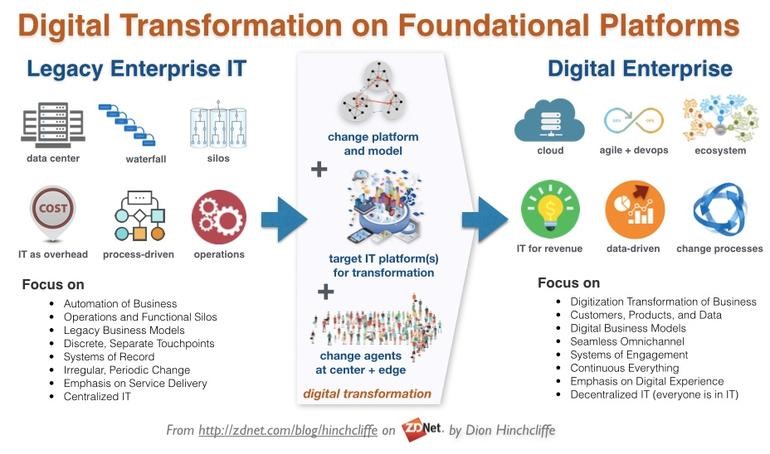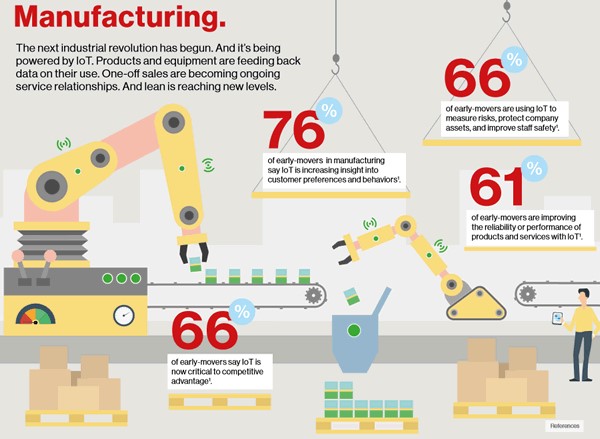How Digital Transformation is Reshaping the Face of Enterprise Technology?
Enterprise technology has been a keystone for organizations around the world since quite long helping to simplify and streamline key business operations.
To put it straight, enterprise technology has been serving like a superglue that connects or rather I should say bridges critical business processes for a business. Now that the business ecosystem is witnessing a major digital revolution in ages, a good number of businesses are footing in big to join the bandwagon in order to stay ahead of the curve.
So what exactly is this digital transformation aka digitization?
Digital transformation is like a comprehensive term that includes a myriad of critical aspects pertaining to the changing technology landscape. Long story short, digital transformation is automation of standalone or legacy processes that involve significant amount of paperwork and manual inputs. Businesses that are emerging with flying colors in today’s race of digitization are the ones that keep abreast with frequently evolving tech trends powered by next-gen business management software solutions.
The need for enterprise technology to keep up with digitization
Today, enterprise technology has reached at its tipping point where organizations get to choose from a pool of options when it comes to business management software. For example, there are traditional enterprise technology solutions, cloud based CRM solutions for small business and mobile based ERP software offering the much-needed flexibility and scalability to businesses around the world. Yes, key business decisions are taken on the go today. Interestingly, the evolution of enterprise technology is helping businesses in breaking the glass ceiling, since a business today is no more confined to office walls.
What to expect from digital transformation and enterprise technology nexus?

Enterprise technology solutions play an integral role when we talk about simplifying and streamlining key business processes including but not limited to backend processes, accounting, inventory, warehouse management, finance, compliance, etc.
Nonetheless, things weren’t the same a few years back, as organizations back then relied on multiple business management software solutions that required intricate data accumulation, integration and migration efforts thereby, turning out to be significantly sluggish, outmoded and inefficient. Adding to the nightmare was the cumbersome task of managing multiple business management solutions followed by lack of a centralized hub for all the business data.
Digital transformation on the other hand has paved way for advance level business management software solutions that support smooth integration with legacy based or existing enterprise systems along with allowing seamless migration and quick access to real time business data on the run. Talk about access to business intelligence on the fly. Long story short, these business management software tools bridge multiple processes, departments and data in an intelligent and seamless manner.
An apt example here is that of a connected or smart factory. Yes, thanks to the inception of Internet of Things (IoT) and Industry 4.0 revolution also known as the Fourth Industrial Revolution, manufacturing equipment are more connected and smarter than before thus, facilitating agile and efficient manufacturing processes.

As mentioned, today’s era is the connected era where smart equipment/products talk to each other via the World Wide Web and the internet of things just fueled it especially for the manufacturing industry, since businesses operating in the manufacturing vertical stand to receive the most out of this nexus.
Take for example monitoring manufacturing equipment and machineries remotely. Internet of Things would facilitate a manufacturing organization to check and diagnose technical issues for connected equipment from a remote location. Now this may include tracking the performance of an equipment to its performance history, efficiency, usage, etc.
Another good example is that of aftersales. For any equipment manufacturing organization, aftersales is all about generating profits and driving revenue. Unfortunately, most of these business houses fail in this very integral aspect. Reason being they greatly rely on traditional aftersales delivery concepts, which are not only ineffective, but are also costly. Talking about conventional delivery model, a technician required to visit and hop between various locations i.e. from the installation site to the manufacturing site and vice versa. Whereas when we talk about connected equipment and products, they not only boost efficiency but also simplify aftersales service. Technicians can diagnose problems on the go from any remote location without the need of visiting site beforehand, which allows them to reach the equipment installation site with all the tools and data to get the equipment up and running. This way, the Internet of Things drives service delivery operations for a great number of equipment manufacturers.
Wondering to how enterprise technology solution would sit here. Fact is that business management software solutions are more than relevant in this context than one can imagine, since these systems hold the key to unlock the real power of the Internet of Things and Industry 4.0 revolution for a manufacturing business.
Enterprise technology tools available in the market today are more service-oriented, modular and scalable in nature thus, helping meet specific business objectives. One of the most prominent benefits of a modular and flexible business management software is that a business can break each module and choose to go with the ones that it needs the most. The biggest reason being the ‘one-size-fit-all’ approach is no more valid in today’s times when one talks about enterprise technology. As a matter of fact, modern business management software solutions support multiple user interfaces besides being accessible to a range of different users at once thereby, ensuring that every individual and department stays on the same page to avoid the problem of data discrepancies and data duplication.
Takeaway
Even though traditional business management software solutions may still sound relevant for some, it is high time that businesses wake up to the idea of digitization to enjoy agile and efficient operations besides streamlining key business processes.
To harness the real power of digitization, businesses would require to first contextualize the data before integrating the same into their workflows. This calls to invest in a next-gen business management software, which should help connect the dots i.e. bridge various processes, people, department and data in a smart and seamless manner.
Related Posts
In almost all forms of modern business, marketing is an essential function.
As the world of eCommerce continues to evolve, businesses are constantly seeking ways to stand out in the digital landscape. According to a report by Statista, it is predicted that global online sales will reach an impressive mark of $6.5 billion by 2023.
In the era of high-speed internet, owning a server with a 10Gbps connection offers an unparalleled advantage in terms of data transfer speed, website performance, and user experience.
To make your business successful in the modern age, you need to excel at digital marketing and have a strategy that can allow you to beat out the competition.
In the ever-evolving landscape of digital marketing, link building remains a cornerstone of search engine optimization (SEO).
In today's age, establishing an online brand presence is crucial for success. With the vast reach and accessibility of the internet, launching your brand online can open up endless opportunities for growth and expansion.













Comments
comments powered by Disqus